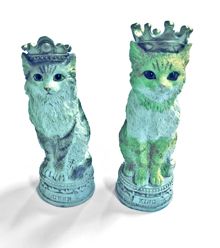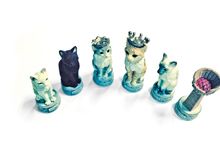Plot your next career move
Don't be a pawn in your professional life. Take action and attack these four fantastic opportunities for team members ready to focus on better client and pet care.

Try some new moves to invigorate your career (Art created by Alison Fulton)

Move 1: Rebate specialist
Who's qualified: This is a great growth position for receptionists who are highly skilled with client communication.
Training needed: Client service, communication and conflict training
What you do: Your team members should know the inside and out of heartworm and flea prevention rebates, but what about the more complicated, less known rebates? Sometimes the rebates for prescription medications are overlooked.
How it helps: Ensuring clients get the best price when buying from you will keep them coming back for more!

Move 2: Behavioral specialist
Who's qualified: Your technical veterinary team members are well positioned to play this role.
Training needed: Behavior training courses from a reputable training program. Remember, this investment in education will pay dividends, both in loyal clients and in the lives you save by protecting the precious bond between pets and their owners.
What you do: Clients often have unruly puppies and dogs. What better way to give your clients a little extra value from their office visit than to have your behavioral specialist come in after the exam and go over the client's concerns with their pet's behavior?
How it helps: The advice could be very useful, and your clients will always remember where they got it!

Move 3: Pet insurance coordinator
Who's qualified: Any member of your veterinary team with a passion for protecting pets' health and offering pet owner options to pay for pets' care.
Training needed: Self-guided reading on pet insurance, free team training at dvm360.com/teammeeting and consulting with pet insurance representatives.
What you do: Depending on where you are, pet insurance may or may not be catching on quite yet. We're only doing ourselves a favor by recommending insurance to our clients. The insurance coordinators in your hospital must have a united front on which pet insurance company and plan you recommend. (Click here for free training to create pet insurance protocols.) All patients, and especially puppies and kittens, could benefit!
How it helps: These experts can discuss what's covered by insurance and guide pet owners on exactly how to file a claim to make the process as easy as possible for your clients.

Move 4: Client communication specialist
Who's qualified: Team members who are passionate about client communication. This position could keep someone busy enough to warrant a permanent part-time role.
Training needed: Client communication learning (self-guided and at local, regional or national continuing education opportunities)
What you do: Some of the most common complaints from clients are usually related to how we communicate. Your clients deserve someone who's willing to always give her all to make sure clients know everything going on.
This position has a wide range of responsibilities, from making sure communication takes place properly in the exam room, to coming up with new ideas to improve client communication.
For example, some clients who board their pets with you would love pictures of their pet having a good time at the kennel sent to their mobile phone. This position would also require a medical aspect. As we know, the veterinary world is constantly coming up with new products and procedures to improve our patients' lives.
How it helps: The communication specialist's job is to stay on the cutting edge of knowledge about new products and services and share them with clients.
Alex Espinosa is the practice manager of Clarkesville Veterinary Hospital in Clarkesville, Georgia.